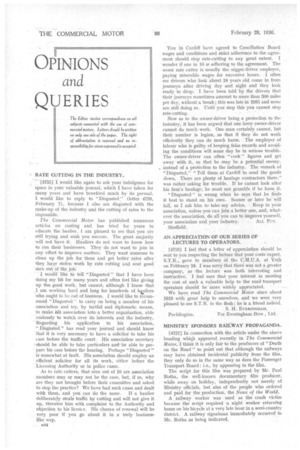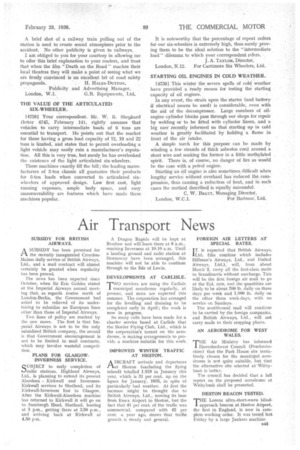OPINIONS
Page 58

Page 59

If you've noticed an error in this article please click here to report it so we can fix it.
• and•
QUERIES QUERIES
would like again to ask your indulgence for space in your valuable journal, which I have taken for many years and have benefited much by its perusal. I would like to reply to "Disgusted" (letter 4739, February 7), because I also am disgusted with the make-up of the industry and the cutting of rates to the impossible.
The Commercial Motor has published numerous articles on costing and has tried for years to educate thu haulier. I am pleased to see that you are still trying and wish you success. The great majority will not have it. Hauliers do not want to know how to run their businesses. They do not want to join in any effort to improve matters. They want someone to clean up the job for them and get better rated after they haxe stolen work by rate• cutting and sent good mein out of the job: '• I Weald like to tell "Disgusted" that I have been doing my bit for many years and often feel like giving up the good work, but cannot, although I know that .1 am working hard and long for hundreds of heiers who ought to be out of business. I would like to recommend "Disgusted to carry on being a member of his association and try, by tactful and diplomatic means, to make his association into a better organization, able ...zealonsly to watch over its interests and the industry. Regarding his 'application to his association, " Disgusted " has read your journal and should know that it is very necessary to have a solicitor to take his . case before the traffic court. His association secretary : should be able to take particulars and be able to prepare his case before the hearing. Perhaps "Disgusted '.' is somewhat at fault. His association should employ an efficient solicitor for all its work, either before the
Licensing Authority or in police cases. .
As to rate cutters, that nine out of 10 are association members may or may not be the case, but, if so, why are they not brought before their committee and asked to stop the practice? We have had such cases and dealt with them, and you can do the same, If a haulier deliberately steals traffic by cutting and will not give it up, threaten him with, complaint to the Authority and objection to his licence: His chance of renewal wilt be . very poor if you go about it in a' truly businesslike way, 1344
You in Cardiff have agreed to Conciliation Board wages and conditions and strict adherence to. the .agreement should stop rate-cutting to any great extent. I
wonder if one in 10 is adhering to thp agreement. The worst rate cutter is usually the. nigger-driver.employer, paying miserable wages for excessive hours. . I often see drivers who look about 18 years old come in from journeys after driving day and night and they look ready to drop. I have been told by the drivers that their journeys sometimes amount to more than 300 miles per day, without a break ; this was late in 1935 and some are still doing so. Until you stop this you cannot stop rate-cutting.
Now as to the owner-driver being a protection to the industry, it has been argued that one lorry owner-driver cannot do much work. One man certainly cannot, but their number is legion, .so that if they do not work efficiently they can do much harm. The employer, of labour who is guilty of keeping false records and avoiding the conditions will some day be in serious trouble. The owner-driver can often "cook" figures and get away with it, so that he may be a potential enemy, instead of a protection to the industry. The remark of "Disgusted," "Tell them at Cardiff to. fiend the goods down. There are plenty of haulage contractors there." was rather asking for trouble. If he cannot look after his firm's haulage, he must not grumble if he loses_it.
" Disgusted " is wrong when he says that he finds it best to stand on his own. Sooner or later he' wilt fail, so I ask him to take -my advice. Keep in your association, unless you can join a better one, and, whatever the association, do all you can to improve yourself, your association and your industry. ALL PUT. Sheffield.
AN APPRECIATION OF OUR SERIES OF LECTURES TO OPERATORS.
[4756] I feel that a letter of appreciation should be sent to you respecting the lecture that your costs expert, S.T.R., gave to Members of the C.M.U. at York on February 18. I was sorry that there was not a greater company, as the lecture was both interesting and instructive. I feel sure that your interest in meeting the cost of such a valuable help to the road transport operators should be more widely appreciated.
We have read The Commercial Motor since about 1919 with great help to ourselves, and we were very pleased to see S.T.F. in the flesh; he is a friend indeed. S. H. EVER1NGHAM,
Pocklington. For Everingham Bros , Ltd.
MINISTRY SPONSORS RAILWAY PROPAGANDA.
[4757] In connection with the article under the above heading which appeared recently in The Commercial Motor, 'I think it is only fair to the producers of "Death on the Road" to point out that although the railways may have obtained incidental publicity from the film, they only do so in the same way as does the Passenger Transport Board: i.e., by appearing in the film. The script for this film was prepared by Mr. Paul Rotha., the well-known documentary film producer, while away on holiday, independently not merely of Ministry officials, but also of the people who ordered and paid for the production, the News of the World.
A railway worker was used as the crash victim because the script required a night worker returning home on his bicycle at a very late hour in a semi-country district. A railway signalman immediately occurred to Mr. Rotha as being indicated. A brief shot of a railway train pulling out of the station is used to create sound atmosphere prior to the accident. No other publicity is given to railways.
I am obliged to you for your courtesy in allowing me to offer this brief explanation to your readers, and trust that when the fihri "Death on the Road " reaches their local theatres they will make a point of seeing what we are firmly convinced is an excellent bit of road safety
propaganda. . H. HALES-DUTTON, Publicity and .Advertising Manager,
London, W;1. G.B. Equipments, Ltd.
THE VALUE OF THE ARTICULATED SIX-WHEELER.
[4758] Your correspondent. • Mr. W. R. Shell
hard (letter 4745, February 14), rightly assumes that Vehicles to carry intermediate loads of 6 tone are essential to transport. He 'points out that the market for those having a gross load capacity of 12, 19 and 22 tons is limited, and states that to permit overloading a light vehicle may easily ruin a manufacturer's reputation.• All this is very true, but surely he has overlooked the existence of the light articulated six-wheelers.
These machines exactly fill the bill; the leading manufacturers of 3-ton chassis all guarantee their products for 6-ton loads when converted to articulated sixwheelers of approved design. Low first cost, light running expenses, ample body space, and easy Manceuvrability are features which have made these machines popular. It is noteworthy that the percentage of repeat orders for our six-wheelers is extremely high, thus-surely proving them to be the ideal solution to the "intermediate . load" dilemma to which your correspondent refers.
J. A. TAYLOR, Direchar, London, N.12. For Carrimore Six Wheelers; Ltd.
STARTING OIL ENGINES IN COLD WEATHER..
[4759] This winter the severe spells of cold' weather have provided a ready means. for testing the starting capacity of oil engines.
In any event, the strain upon the starter (and battery if electrical means. be tisedY is considerable, even with the aid of the decompressor. Large numbers of oilengine cylinder blocks pass through our shops for repair by welding or to be fittedwith cylinder liners, and .a big user recently informed us that starting-up in cold weather is greatly facilitated by holding a flame in front of the air intake.
A simple torch for this purpose can be made by winding a few strands of thick asbestos cord around a stout wire and soaking the former in a little methylated spirit. There is of course, no danger offire as would be the case with a petrol engine.
Starting an oil engine is also sometimes ,,difficult when lengthy service without overhaul has x-educ.e4 the, compression, thus causing a reduction of heat, and in such cases the method described is equally successful.
• C. W. BRETT, Managing Director, . London, W.C.1. For Barinmr,'Ltd.




























































































